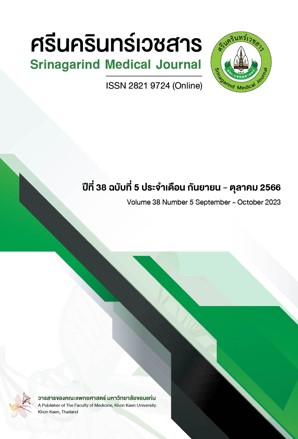Effects of Infectious Waste Management Program on Behavior and Amount of Infectious Waste of Health Personnels in Hospitals, in Roi-Et Province
Keywords:
waste management, behavior, amount of infectious wasteAbstract
Background and objective: Infectious wastes were wastes contaminated with large amount of various pathogens which if come in close contact with them could cause infection and illness. The aim of this study was to compare management behavior and amount of infectious waste in hospitals in Roi-Et Province, at before and after receiving the infectious waste management program.
Methods: This research was conducted quasi-experimental, a one-group pretest-posttest design. Twenty of hospitals in Roi-Et province were participants a responsible for or related to infectious waste management. Forty seven of participants who met the inclusion criteria, which were drawn by simple random sampling. The instrument used in the experiment was an infectious waste management program. Data were collected using a questionnaire consisting of gender, age, education level, marital status, income and work experience related to infectious waste management and waste management behavior with cronbach's alpha coefficient equal to 0.75, and data were analyzed using frequency, percentage, mean, standard deviation, Paired t-test and %difference. 95% confidence interval.
Results: After intervention, it was found that sample group had an overall mean score of infectious waste management behavior (p<.001), with an mean score of infectious waste management behavior increasing by 0.81 scores (95%CI: 0.69, 0.92), and hospitals in Roi-Et province managed infectious waste with an amount of 462,634 kilograms or 46.26 tons of infectious waste per year, indicating an increase of 31.41 percent.
Conclusion: This developed infectious waste management program resulted in target group having higher infectious waste management behavior scores and collecting more infectious waste.
References
Department of Health. Handbook of the Public Health Act B.E. 235 1992 and its amendments. December 2018. Bangkok: Agricultural Cooperative Assembly of Thailand Limited; 2018.
Roi-Et Provincial Public Health Office. Infectious waste management in hospitals, Roi-Et.
environmental and occupational health group; 2021.
WHO. 2014. safe management of wastes from health-care activities. available from :
http://www.who/his/sds/2010.8, [cited May 21,2020].
WHO. 2016. interim infection prevention and control guidance for care of patients with
suspected or confirmed filovirus hemorrhagic fever in health-care setting
available from : http://www.who/his/sds/2014.4, [cited October 10,2020]
Unite Kingdom. The management of waste from health, social and personal care RCN
Guidance; 2016.
Bureau of environmental health, department of health. academic document on
infectious waste management for staff of the department of health. Nonthaburi.
bureau of environmental health, Department of Health; 2018.
Chansupasen W. The effect of cleaners safety training program on knowledge
and practices regarding infectious waste management among cleaning personnel in
phayao hospital. J Nurs Health Res 2017;18(1):113-22.
Cohen J. Statistical power analysis for the behavioral sciences (2nd ed.). hillside,
NJ: Lawrence erlbaum associates; 1988.
Chaisri Y, Kittitornkool Y, Suksaroj T. the development of infectious waste
management system in huasai hospital, Nakhon Si Thammarat province.
huasai hospital, Nakhon Si Thammarat province; 2014.
Sridaromon P. situation study of infectious waste management in private hospitals.
bureau of environmental health, Department of Health; 2017.
Saiwongpia K. infectious waste management model, Lampang province.
Thammasat university. Theses; 2016.
Intiya N, Laowansiri. S. comparison of composition and generation rate of infectious
waste in medium size hospital and large size Hospital: a case study on
Nakhonphanom province. The Public Health Journal of Burapha University
;16(1):14-27.
Bandura A. Organizational application of social cognitive theory. Australian.
Journal of Management 1988;13(2):275-302.
Downloads
Published
How to Cite
Issue
Section
License
Copyright (c) 2023 Srinagarind Medical Journal

This work is licensed under a Creative Commons Attribution-NonCommercial-NoDerivatives 4.0 International License.




